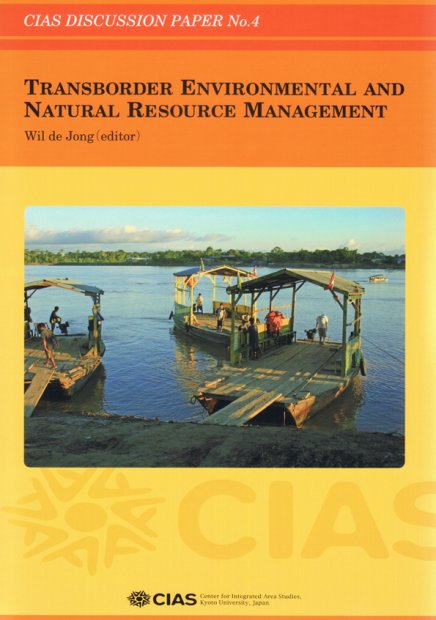"Transborder Environmental and Natural Resource Management"(2007/12/5-7)
Date: December 5-7, 2007
Venue: Kyoto University International Conference Hall
Many of the world’s environments and their natural resources can only be preserved or used sustainably through concerted efforts that involve collaboration between parties across national boundaries. Such transborder environmental and natural resource management is becoming increasingly important to assure the survival of the world’s natural assets and reduce political, social and economic costs from transborder environmental and natural resource conflicts.
To contribute to the scientific understanding of the topic CIAS, CML, CAPAS and UNU organize a symposium where specialists in transborder environmental and natural resource management analyze individual transborder cases from Asia, Europe and elsewhere to assess the scope of the topic, identify general patterns and communalities and develop better theoretical underpinnings that may guide some of the cooperation, negotiations and conflict mediation that are likely to increase in years to come.
The symposium will be held between December 5 and 7 at the Kyoto University International Conference Hall. The 21 confirmed participants who present cases studies to guide the discussions are from Asian and European countries. The sessions on December 5 and 6 are open for the public.
|
DECEMBER 5
|
||
| 9.00 | REGISTRATION | |
| 9.30 | OPENING –Tanaka, Koji and Persoon, Gerard | |
|
SESSION ONE – MULTILATERAL ENVIRONMENTAL COOPERATION |
||
| 10.00 |
1
|
He, Shengda |
| 10.30 |
2
|
Sriburi Thavivongse |
| 11.00 | COFFEE BREAK | |
| 11.30 |
3
|
Lei, Zhuning |
| 12.00 |
4
|
Zhang, Luo-Ping |
| 12.30 | LUNCH | |
|
SESSION TWO – TRANSBORDER CONSERVATION |
||
| 14.00 |
5
|
Gerard Persoon |
| 14.30 |
6
|
Andres Masipiquena |
| 15.00 |
7
|
Gaku Ohashi |
| 15.30 | TEA/ COFFEE BREAK | |
| 16.00 |
8
|
Marcus Schaller |
| 16.30 |
9
|
Johan Iskandar |
| 17.00 |
10
|
Jeong, Dai-Yeun |
| 17.30 | SUMMARY OF THE DAY AND CLOSING – Wil de Jong | |
| 19.00 | WELCOME DINNER | |
|
DECEMBER 6
|
||
|
SESSION THREE – TRANSBORDER RIVER MANAGEMENT |
||
| 9.00 |
11
|
Xuan, Vo Tong |
| 9.30 |
12
|
Denyse Snelder |
| 10.00 |
13
|
Darryn McEvoy |
| 10.30 | COFFEE | |
|
SESSION FOUR – TRANSNATIONAL MARINE RESOURCES MANAGEMENT |
||
| 11.00 |
14
|
Kuan-Hsiung Wang |
| 11.30 |
15
|
Jun Akimine |
| 12.00 |
16
|
Yann-huei Song |
| 12.30 | LUNCH | |
|
SESSION FIVE – THE STATE AND BORDERLANDERS |
||
| 14.00 |
17
|
Serge Bahuchet & Rebecca Hardin |
| 14.30 |
18
|
Noboru Ishikawa |
| 15.00 |
19
|
Dave Lumenta |
| 15.30 | TEA COFFEA BREAK | |
| 16.00 |
20
|
Wil de Jong |
| 16.30 |
21
|
Koji Tanaka |
| 17.00 |
22
|
Masayuki Yanagisawa |
| 17.30 | SUMMARY OF THE DAY – Gerard Persoon | |
| 17.45 | SUMMARY OF THE EVENT AND CLOSING OF PRESENTATION SESSIONS | |
>>http://www.cias.kyoto-u.ac.jp/index.php/news_detail/id/97
Research Reports;
On December 5-7, 2007, a symposium on the theme of “Trans-border Environmental and Natural Resource Management” was held in the Kyoto University Clock Tower Centennial Hall, featuring presentations and debates regarding problems created worldwide – in Asia, Africa, Europe, and the Americas – by the presence of borders. It was shown, through case studies on the significant impacts on local societies of economic areas that stretch beyond borders, such as water damage caused in downstream areas by upstream dams, cross-border environmental pollution, and the indiscriminate use of resources caused by a lack of governance in border regions. That in today’s world, where human activities are growing larger in scale, it is imperative, in considering the humanosphere and sustainable development, to examine borders and the movements of people related to them. The fact that most of the participants from East Asia and continental Southeast Asia brought up relations with China as one trans-border issue was deeply intriguing, as it demonstrated that the presence of China is growing in that region, and it made us consider the possibility that changes in the humanosphere in continental Southeast Asia, which has a long border with China, will continue to accelerate. (Hoshikawa Keisuke)



